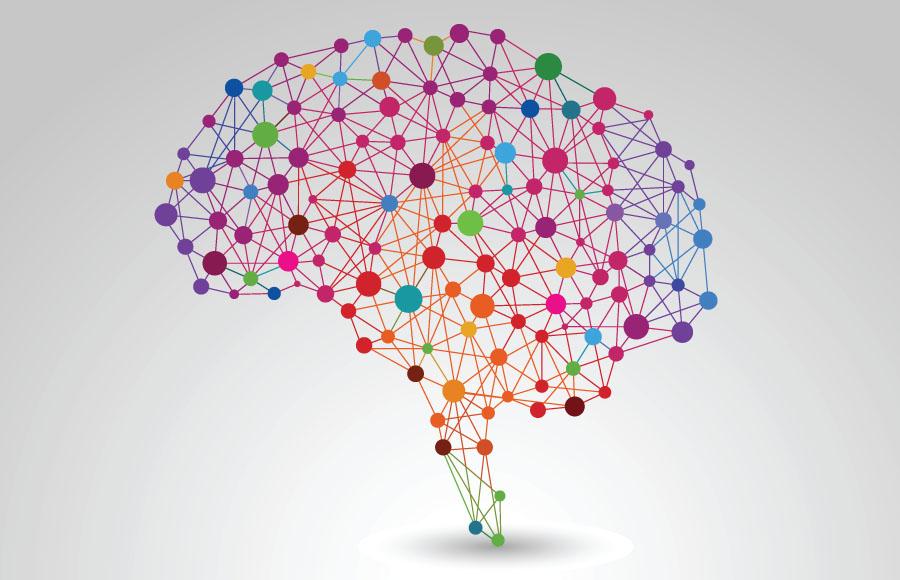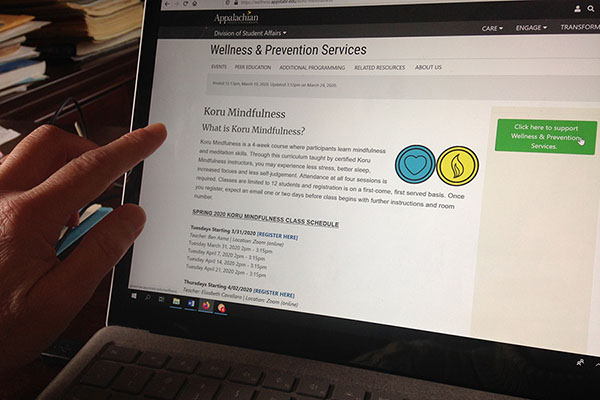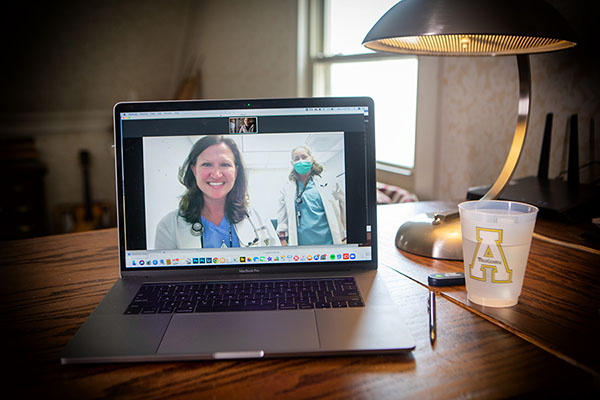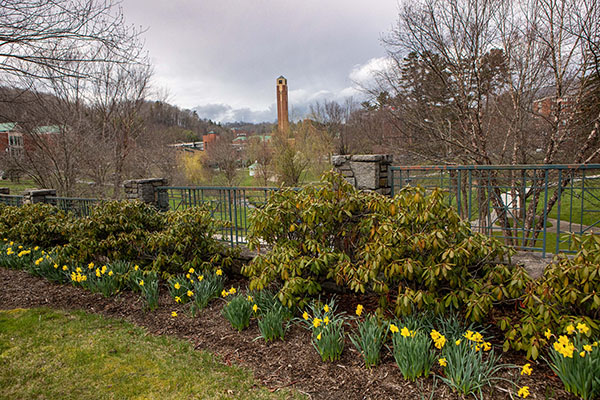
Some of the pandemic-related concerns being addressed by Appalachian’s Counseling and Psychological Counseling Services Center include symptoms of anxiety and depression, grief, career and financial concerns, challenges with family relationships and social isolation. Shutterstock/Anita Ponne image
BOONE, N.C. — The Appalachian State University Division of Student Affairs continually examines ways to expand and improve student mental health and wellness services and resources. Now, amid uncertainties of the impact of the coronavirus pandemic, the division continues to reevaluate and tailor student mental health support.
In response to the current COVID-19 pandemic, most of Appalachian’s health and wellness services have been transitioned to online telehealth options, and the Counseling and Psychological Services Center has added resources to help students manage mental health during and after this time of social or physical distancing.
“Some of the general concerns we have been addressing include symptoms of anxiety and depression, grief, career and financial concerns, challenges with family relationships and social isolation,” said Dr. Emily Lazar, a staff psychologist at the center.
But ensuring the mental health of students is a constant and ever-evolving priority.
Trends indicate that college students nationwide have increasingly been diagnosed and treated for mental health issues. The rate of treatment — including treatment administered at both on- and off-campus centers — increased from 19% of students nationwide in 2007 to 34% in 2017, according to a study by the American Psychiatric Association.
Appalachian’s rate of treatment on campus during the 2018–19 academic year — 15% of the student population — is within the norm, said Dr. Alex F. Howard, interim assistant vice chancellor and director of wellness and prevention services for Appalachian’s Student Affairs. Off-campus treatment rates, including students treated in their home communities or locally, are not measured.
But, needs for mental health care among students may be higher because of the pandemic, said Dr. Kurt Michael, Appalachian’s Stanley R. Aeschleman Distinguished Professor of Psychology and the assistant department chair of the Dr. Wiley F. Smith Department of Psychology.
“Remaining isolated at home can exacerbate feelings of loneliness and complicate existing mental health ailments, such as anxiety and depression,” said Michael, who has addressed youth behavioral health during the COVID-19 crisis in an article published in the March edition of the North Carolina Medical Journal.
“Though the world has not experienced a pandemic of this magnitude in over 100 years, I anticipate there will be increased needs for support long after the COVID-19 pandemic has subsided,” Michael said. Howard said even prior to the pandemic there began conversations about ensuring a sufficient number of providers, considering national trends toward increased demand for services and Appalachian’s planned enrollment growth.
“We are working through a number of scenarios and their corresponding staffing structures in efforts to have viable plans for operations to best serve our students,” Howard said.
Some of the center’s services:
- Initial phone consultations to help students interested in continuing or getting started with services.
- Updated emergency services for students in the Boone area as well as elsewhere.
- Self-help resources to assist during COVID-19.
- Quick Access virtual workshops, including Anxiety Toolbox, Kind Mind and HEALS (Healthy Emotions and Life Skills).
- Individual counseling sessions online through telemental health.
- Additional local and national resources available on the Office of the Dean of Students’ Case Management webpage.
The number of new students seeking mental health services from Appalachian’s Counseling Center was lower in the spring 2020 semester compared to typical spring semesters, according to Dr. Christopher Hogan, director of Appalachian’s Counseling and Psychological Services Center.
“There is not a confirmed reason for this,” Hogan said. “It may be related to some students being at home with their family and support system. For some students, they may have experienced a decrease in commitments to extracurricular activities, reducing stress from hectic schedules. Another possibility is that students are focusing their energy on trying to adapt to a life situation that has changed rapidly, and they are working to understand what this means for them before seeking services.”
Hogan added that out of approximately 200 responses to an informal survey in mid-April for the Association of University and College Counseling Center Directors (AUCCCD), only 1% of counseling centers indicated they had experienced an increase in service requests.
Students have expressed appreciation for the support they are receiving from the Counseling Center during the transition to primarily online services, Hogan said, adding, “They seem to be understanding of the unique circumstances that have shifted how we deliver our services, and we will continue to evolve to meet student needs.”
Incorporating graduate students in long-term expansion of services
While Appalachian is within the appropriate limits for accreditation for student-to-provider ratios, Howard said they are “exploring shifts within the organization that might open the doors for increased opportunities within clinical science.” This could include expanding the model to include more graduate students in the clinical practice, Howard said.
Each year, a total of 10–12 graduate students from Appalachian’s clinical and mental health counseling (CMHC), marriage and family therapy and Master in Social Work programs serve their clinical preceptorships in student health facilities on campus. Preceptorships allow students to gain real-world experience in a clinical setting under the supervision of qualified health care staff.
Howard said Student Affairs is working with faculty in these academic programs to explore increasing practica opportunities for graduate students.
“There is a substantial amount of research that indicates the power of peer-to-peer engagement in support services,” Howard said. “In addition, our clinical feedback shows that our students have very positive experiences and make progress with both our professional staff and the graduate students under our supervision.”
Dr. Mark Schwarze, assistant professor in and director of the CMHC program, said, “These experiences allow students to move from theory to practice and learn how to be genuine and authentic in therapeutic relationships. They are prepared to move into graduation, licensure and, ultimately, practice as professional counselors.”
“This is a great opportunity to the students to be of service to the campus community, to gain invaluable experience and to serve the greater good,” Schwarze said.
What do you think?
Share your feedback on this story.
About Appalachian’s Counseling and Psychological Services Center
The Counseling and Psychological Services Center at Appalachian State University supports the mission of the university and its Division of Student Affairs in the academic, vocational, emotional, social and cultural development of students. The goal of the center is to assist the Appalachian Community in maximizing the personal growth and development of its members. Services, which are primarily offered to students, focus on education, prevention, remediation and crisis management. These services help students resolve personal difficulties and acquire the attitudes, abilities and knowledge that will enable them to be successful and take full advantage of their college experience. Learn more at https://counseling.appstate.edu.
About the Dr. Wiley F. Smith Department of Psychology
Appalachian State University’s Dr. Wiley F. Smith Department of Psychology serves more than 1,400 undergraduate majors seeking the Bachelor of Arts or Bachelor of Science degree in psychology, as well as 90 graduate students across four graduate programs: experimental psychology (MA), industrial-organizational psychology and human resource management (MA), school psychology (MA/SSP) and clinical psychology (PsyD). Learn more at https://psych.appstate.edu.
About the College of Arts and Sciences
The College of Arts and Sciences (CAS) at Appalachian State University is home to 17 academic departments, two centers and one residential college. These units span the humanities and the social, mathematical and natural sciences. CAS aims to develop a distinctive identity built upon our university's strengths, traditions and locations. The college’s values lie not only in service to the university and local community, but through inspiring, training, educating and sustaining the development of its students as global citizens. More than 6,800 student majors are enrolled in the college. As the college is also largely responsible for implementing App State’s general education curriculum, it is heavily involved in the education of all students at the university, including those pursuing majors in other colleges. Learn more at https://cas.appstate.edu.
About Appalachian State University
As a premier public institution, Appalachian State University prepares students to lead purposeful lives. App State is one of 17 campuses in the University of North Carolina System, with a national reputation for innovative teaching and opening access to a high-quality, cost-effective education. The university enrolls more than 21,000 students, has a low student-to-faculty ratio and offers more than 150 undergraduate and 80 graduate majors at its Boone and Hickory campuses and through App State Online. Learn more at https://www.appstate.edu.






![How NCInnovation Is Rethinking Economic Development in North Carolina [faculty featured]](/_images/_posts/2026/02/rethinking-economic-development-600x400.jpg)







